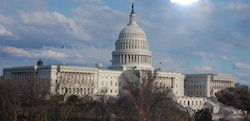This week the Energy and Power subcommittee of the Energy and Commerce Committee heard testimony from Energy Secretary Ernest Moniz and Environmental Protection Agency Administrator Gina McCarthy about the President’s climate plan. This past June, President Obama unveiled his new action plan for climate change. Many of the opponents of the plan are criticizing the proposed regulations from EPA for new and existing power plants, which they argue will increase costs for consumers and send jobs overseas but haven’t put forth alternative solutions.
Mark Reynolds, executive director of Citizens Climate Lobby said the time dedicated to the hearing would be better spend talking about effective alternatives to Obama’s plan. “We  understand that conservatives object to the use of EPA regulations to curb greenhouse gases,” he said. “If that’s the case, and given the rapidly closing window for action on climate change, they should be talking about a market-based alternative, such as a revenue-neutral carbon tax.”
understand that conservatives object to the use of EPA regulations to curb greenhouse gases,” he said. “If that’s the case, and given the rapidly closing window for action on climate change, they should be talking about a market-based alternative, such as a revenue-neutral carbon tax.”
Citizens Climate Lobby proposes a steadily-rising carbon tax and returning proceeds to the public to offset increased energy costs. A number of conservatives have expressed support for this approach and Reynolds said they should be called to testify at the next hearing.
“I’m grateful that Chairman Ed Whitfield convened today’s hearing, and I hope there are more to come in the near future,” continued Reynolds. “Having held a hearing to critique the President’s plan, the next hearing should focus on solutions.”
Among them, Art Laffer, former Reagan economic adviser said, “Reduce taxes on something we want more of–income–and tax something we arguably want less of–carbon pollution. It’s a win-win.”
While Greg Mankiw, economic advisor to George W. Bush and Mitt Romney commented, “A proposed carbon fee — or carbon tax, if you prefer — is more effective and less invasive than the regulatory approach that the federal government has traditionally pursued.”
Reynolds concluded, “It’s easy to sit and complain that the President is trying to circumvent Congress. Congress, however, has failed to protect our nation from the risk of climate change. It’s time to stop complaining and take action.”

